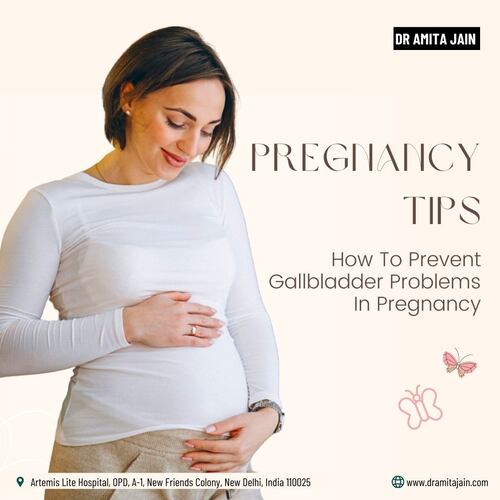Motherhood is a transformative journey filled with joy, challenges, and responsibility. During pregnancy, a woman’s body undergoes numerous changes to nurture the growing baby. However, these changes can also lead to specific health issues, including gallbladder problems, which are often linked to hormonal fluctuations says Delhi’s top laparoscopic surgeon and specialist for gallbladder Dr Amita Jain.
Why Pregnancy Increases Gallbladder Risks?
Pregnancy increases the risk of gallbladder issues due to hormonal changes. Progesterone, which relaxes muscle tissues to prepare the body for pregnancy, slows the release of bile from the gallbladder. This disrupted bile flow can lead to gallstones. Similarly, elevated estrogen levels increase cholesterol secretion, further contributing to gallstone formation.
What are Some of the Common Gallbladder Issues During Pregnancy?
Gallstones
Gallstones form when bile hardens due to slowed release and increased cholesterol levels. They affect about 8% of pregnant women, though symptoms like abdominal pain, nausea, and vomiting occur in only 1% of cases. While many gallstones resolve naturally, some block ducts, causing inflammation and infection that require medical attention.
Cholestasis
Intrahepatic cholestasis of pregnancy (ICP) slows bile movement, leading to a buildup in the liver and bloodstream. Symptoms include severe itching without a rash, dark urine, and jaundice. This condition, most common in the third trimester, can increase risks of premature birth, stillbirth, and complications for the baby.
Biliary Colic
Biliary colic occurs when gallstones temporarily block ducts, often triggered by a fatty meal. While mild attacks may resolve spontaneously, persistent pain from a lodged stone can lead to acute cholecystitis, requiring medical intervention.
Biliary Sludge
Biliary sludge forms when bile stays in the gallbladder too long, combining with mucus, cholesterol, and calcium salts. It may cause symptoms like abdominal pain, nausea, and vomiting, though many cases resolve naturally postpartum.
Diagnosing Gallbladder Problems During Pregnancy
Diagnosis typically involves a review of symptoms and physical exams to detect tenderness near the gallbladder or signs like jaundice. Blood tests assess inflammation and organ function, while imaging techniques such as ultrasound identify gallstones or blockages. In complex cases, advanced methods like Endoscopic Retrograde Cholangiopancreatography (ERCP) provide detailed visualization of bile ducts.
How to Prevent Gallbladder Issues During Pregnancy?
Adopt a High-Fiber Diet
Include fiber-rich foods like fruits, vegetables, and whole grains. Focus on vitamin-packed options like spinach, broccoli, and kale.
Practice Healthy Weight Management
Aim for gradual postpartum weight loss (no more than 1 kg per week) to reduce strain on the gallbladder.
Stay Physically Active
Engage in moderate exercise for at least 30 minutes, five times a week.
Choose Low-Fat Foods
Limit fatty meals to prevent gallbladder pain. Replace red meat with lean proteins like poultry and opt for low-fat dairy products.
Stay Hydrated
Drink plenty of water to support digestion and prevent bile buildup. Avoid sugary drinks and sodas.
Focus on Whole Foods
Choose fresh, unprocessed foods over items with trans fats or preservatives. Prepare homemade snacks like vegetable slices or sprouted grains.
Consult Your Doctor Promptly
Seek medical attention if you notice symptoms like severe abdominal pain, jaundice, or persistent nausea to ensure timely intervention.
Gallbladder issues during pregnancy, while manageable, require awareness and proactive care. A balanced diet, physical activity, hydration, and avoiding processed foods can reduce risks. Prompt medical consultation ensures a safe pregnancy and minimizes complications for both mother and baby.

Dr Amita Jain is a surgeon with the highest degree of professional competence, precision and surgical craftsmanship. Performed all complicated general surgery procedures with in depth knowledge of invasive and few minimal invasive and onco surgical techniques. Underwent special training in trauma, executed various trauma-related complex life-saving neurosurgical procedures, reconstructed injured mangled limbs and performed vascular and reconstructive procedures with critical care.
Dr Amita Jain holds 28 plus years of rich experience in Trauma and General Laparoscopic Surgeries (including Gallbladder stone removal, appendix removal, hernia repair surgery, piles and fissure surgeries). She was the Professor Surgery of at the Army College of Medical Sciences and Base Hospital Delhi Cantt. In 1994 she was commissioned as Surgeon under the United Nations Mission in Congo. From 2020 to 2022, she worked with Bansals Hospital. Currently, Dr Amita Jain is the Sr. General and Laparoscopic Surgeon at Rainbow Children Hospitals, Malviya Nagar, Delhi.
Or Call Us at +(91) 882-6615301

